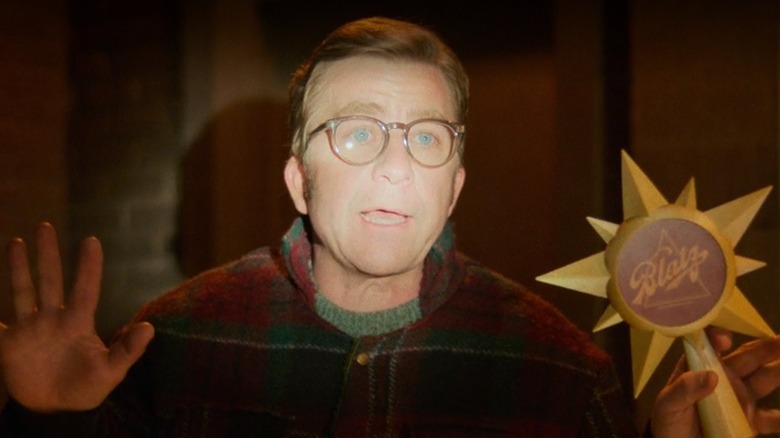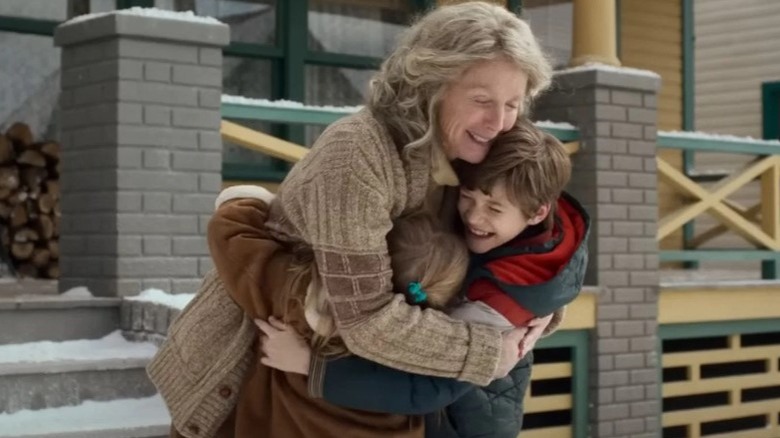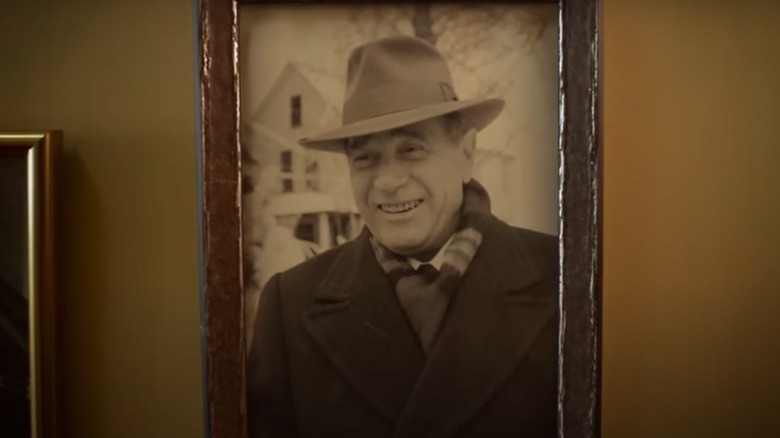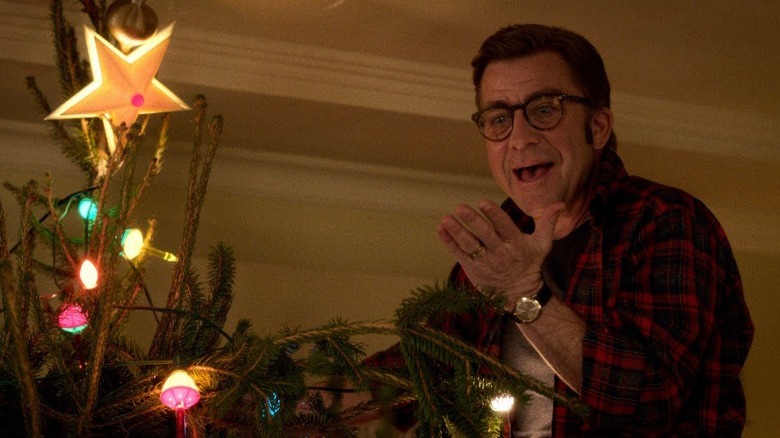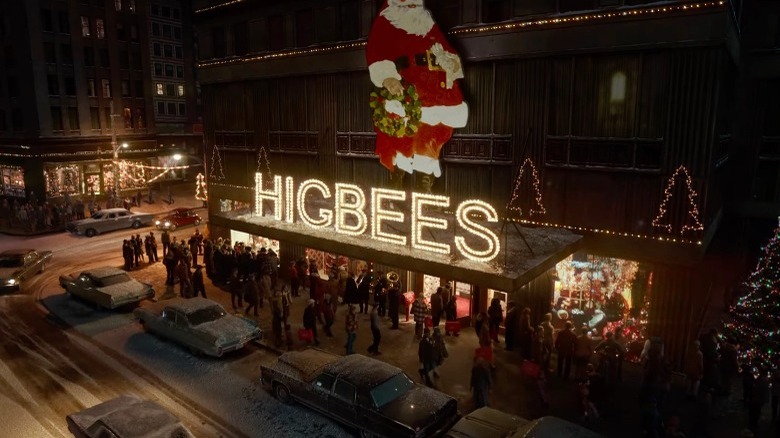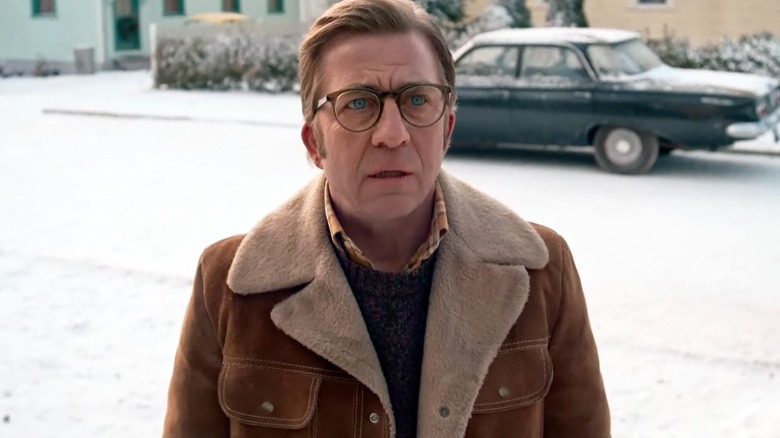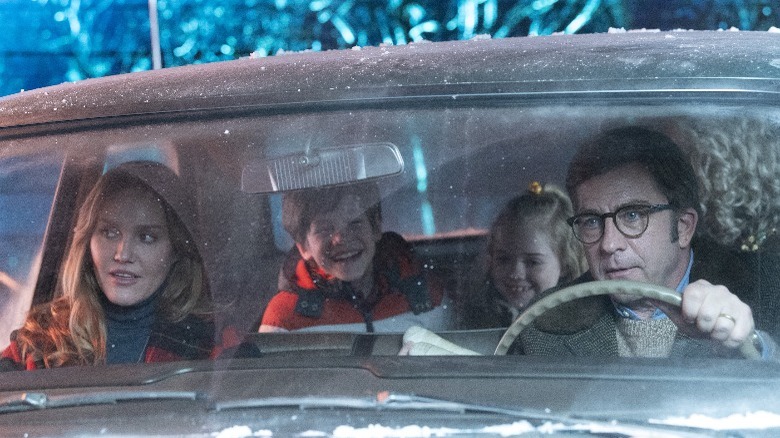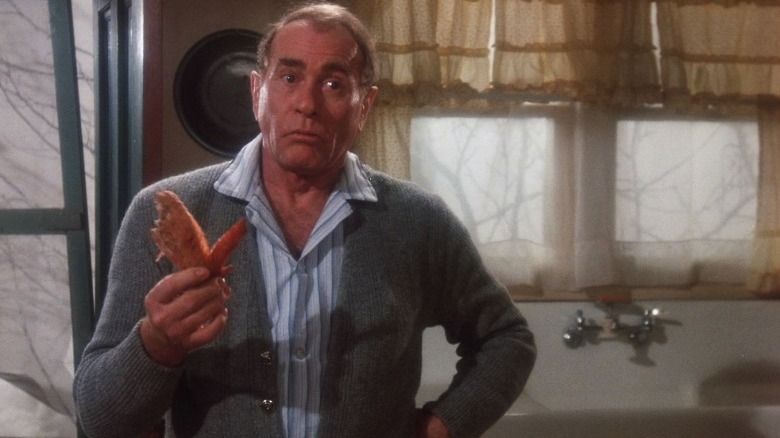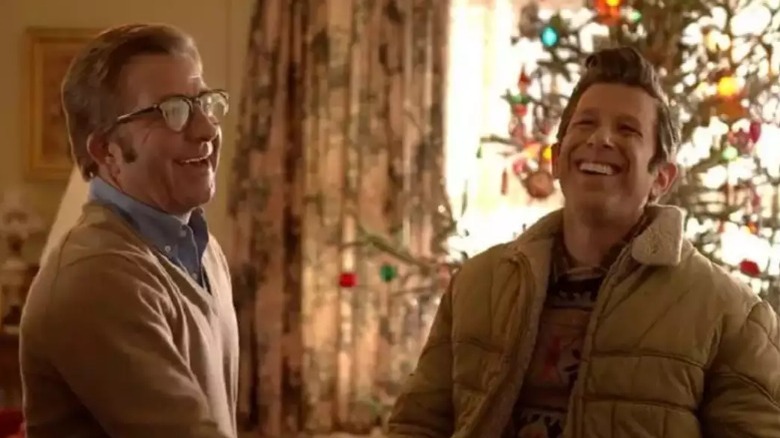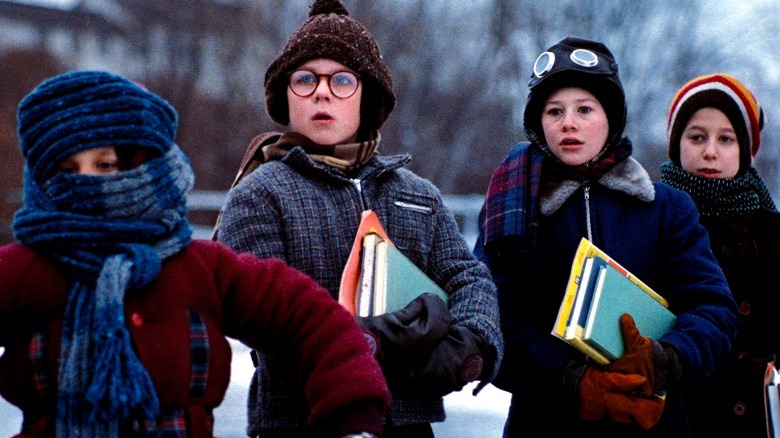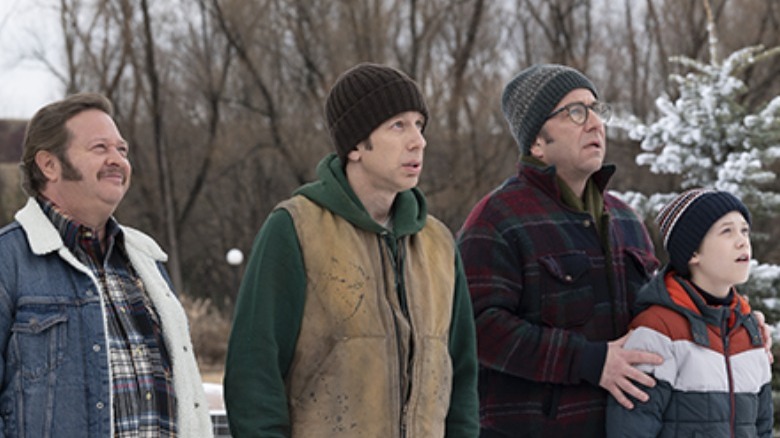A Christmas Story Christmas Moments That Really Upset Fans The Most
Will the Bumpuses ever control their dogs? Well, 30 years later, they're still terrorizing the neighborhood and are likely the offspring of the same hounds who tormented the Old Man. But what would a Parker family Christmas be without gazing through the lenses of nostalgia spectacles? Like the Bumpus clan's rambunctious hounds, there are countless references to a Christmas "that once was" in this sequel to the beloved 1983 film "A Christmas Story." Ralphie (Peter Billingsley) is all grown up complete with a family of his very own. Now, he has two rugrats that are counting on him to give them the same stellar Christmas experience that he received from his Old Man. Even though Ralphie's made his deepest Christmas desires known to all who'd listened, it was ultimately the Old Man who knew exactly what Ralphie wanted: "an official Red Ryder, carbine action, 200 shot range model air rifle."
"A Christmas Story Christmas" brings Ralphie back to his childhood hometown in Hohman, Indiana as his family hopes to celebrate the Christmas season with his mother in warm remembrance of the Old Man who had just passed away. The film brings back the original film's cast with the exception of Ralphie's mother who is portrayed by Julie Hagerty instead of Melinda Dillon. With the '70s in full swing, the times might have changed but not Ralphie's old stomping grounds. Higbee's still stands as the Christmas extravaganza that it is with eager shoppers peering into the big window at the hottest toys on sale for the Christmas season. There's plenty of nostalgia for fans to sift through in this hearty sequel. But that didn't stop some viewers from having issues with the film overall. Let's take a gander at the things that irked fans the most.
Recasting Ralphie's mother
Remarkably, the film sees the return of nearly all of Peter Billingsley's old cast mates from the original film. Scott Schwartz and R.D. Robb return as Ralphie's old pals Flick and Schwartz respectively. Flick now owns a bar appropriately named Flick's Tavern, a joint that sees Schwartz frequent as a patron. Ralphie's brother Randy (Ian Petrella) also makes a few brief appearances. We even get to see Zack Ward reprise his role as the reformed bully Scut Farkus. Now a police officer, Scut has nothing but respect for Ralphie after the beating he gave him when they were kids. Farkus turned over a new leaf long ago and made something of himself.
Despite all the familiar faces, there are two noticeable absences. The first is Darren McGavin as the Old Man. McGavin died in 2006, so a reprisal was, of course, impossible. The other absence is the original actress who played the role of Ralphie's mother, Melinda Dillon. Whether she was cleaning Ralphie's mouth out with soap or scolding her children for not eating their vegetables, Mrs. Parker was the stereotypical matriarch of the era. In this sequel, she's been replaced by Julie Hagerty since Dillon has long been retired from acting with her final onscreen appearances being in 2007. Some fans took umbrage with the casting, however. Redditor Nobodycares2022 shared, "I didn't care for the choice of Julie Haggerty to replace the mom. They portrayed the mom in the original as loving, funny smart, and the reasonable one of the family minus a few scenes. The mom character in this movie was just bad in my opinion." But, of course, that would have more to do with how the character was written than the actress' portrayal.
Not enough grief over the death of the Old Man
When you think of "A Christmas Story," it's likely that you get the warm fuzzies inside as you imagine your own nostalgic childhood Christmases of yesteryear. Of course, we would want any follow-up film to convey the same sense of child-like wonder and joy. However, "A Christmas Story Christmas" begins with the heavy news that Ralphie's Old Man has shuffled off this mortal coil heading into the great beyond. No one wants a film that focuses on the dour atmosphere of a beloved family member's death. That'd be far too depressing for any lasting Christmas joy. The film addresses the sudden death and briefly touches upon Ralphie and his family's grief over the Old Man's passing.
But remarkably, the family presses forward seemingly lacking the level of grief we'd expect given the close proximity of the event to Christmas. When Ralphie speaks to his brother, Randy, over the phone, the younger sibling seems hardly broken up about it. In fact, he's not even home like we'd expect him to be. The family even pushes off funeral services in favor of "enjoying the holidays" like the Old Man would want them to. It doesn't feel entirely natural. Redditor I_am_u_as_r_me quips, "the dad dies and it's like welp just another regular day." Another Redditor, buckytoothtiger, shares the glaring issue that bothered them with the film. "The Old Man died mere days before Christmas. Aside from one scene, no one seems the least bit sad." The filmmakers had to balance the weighty nature of the Old Man's passing and honoring his legacy with the joy of the season, a tough tight rope to walk. But it did fall short on the grief that'd be expected.
Missing Jean Shepherd
No one can forget the color or grandeur of the exposition at play in the original film. Ralphie is counting down the days until the big man drops down the chimney to deliver the BB gun he's always wanted. But the film is just as much about the journey as it is about the final destination. In the days that lead up to the best Christmas of Ralphie's childhood, we see him live the life of a wondrous young lad in the early 1940s. He goes to school, pulls pranks with his friends, gets chased by bullies, attempts to solve a puzzle from his favorite radio show, and even drops the F-bomb in front of his father for the first time.
These are all typical mundane experiences in the life of a child during that era. But what makes them so entertaining to watch is Jean Shepherd's stellar narration. It exudes slice-of-life naturalism with a dash of fervor and zeal for each moment recounted by the elder Ralphie that it's like he's remembering the entire sequence of events as if it were last week or a vivid dream. Of course, the original film is famously based on Jean Shepherd's novel, "In God We Trust: All Others Pay Cash." But some fans miss Shepherd's take on a childhood Christmas. Redditor TheNittanyLionKing writes, "Peter Billingsley did a good job reprising his role, but something was off about him as the narrator this time around." But they acknowledged that there really isn't another way to do this considering Ralphie is the adult now that he is when providing the narration in the original film. Still, it's difficult not to recall Shepherd's iconic vocal stylings fondly.
Forced references to the original
Is a sequel to a film about the best childhood Christmas even possible, let alone necessary? The answer to both of these questions is likely "no." But somehow, the filmmakers managed to pull off an entertaining and joyous reflection on one of the most iconic Christmas classics of all time. Of course, in order to do this, we had to expect that "A Christmas Story Christmas" would draw heavily from the original film since that's where the nostalgia lies. And it did, indeed draw heavily from its predecessor. In fact, the flashbacks, jokes, scenic references, and constant reflection on the bygone era were used so much, that the sequel often feels like one giant homage to "A Christmas Story" more than it does a standalone story of its own.
Fans took notice of the frequency at which the film plugged in details that recounted the first film. Redditor RobPlaysThatGame writes, "a lot of the callbacks felt forced and didn't land for me." The credits show comparisons of scenes from the film with scenes from the original that really put into perspective how much the film endeavored to recreate moments from the past. The "forced" feeling might be even more prevalent after seeing that. Redditor MalignantFanAccount shared, "there's a lot of bad attempts at humor with whole scenes that don't work at all. Mostly when it's trying to recreate iconic moments from the original." Perhaps the filmmakers should've attempted to create a few iconic moments specific to the sequel film.
It didn't feel like the '70s
The original film is famously set in the early 1940s. We are never apprised of the specific year in which the film occurs, but the setting ranging from the home and its furnishings all the way down to the automobiles driven gives us all the sensation of the era. It's a period piece that hearkens to a simpler time when the modern comforts of technology including phones, the internet, and social media platforms didn't drain all of our attention. Instead, time was focused on comradery with friends outdoors and around the neighborhood. Heck, if you didn't know any better, there's no sense that a global conflict is looming on America's doorstep given the gleeful innocence of Ralphie's childhood.
Of course, the sequel takes place in 1973, three decades later when Ralphie is all grown up. There's no mistaking that the decade of free love had its own style and brand that is iconic to the period. The film depicts the period in the family's fashion as well as the updates made around Hohman, Indiana. However, some viewers didn't really feel the vibe of the '70s all that strongly in "A Christmas Story Christmas." In fact, one Redditor, Known-Ad-100, shared that the depiction of the era was the worst aspect of the film. "I think the hardest part for me was the era setting... it felt very 2022 to me," the Redditor remarks. While it's hard to say that there is remotely anything in the film that resembles 2022, it seems the '70s brand wasn't emphasized enough for some.
The acting wasn't the best
The filmmakers behind "A Christmas Story Christmas" accomplished a great feat. They managed to bring back many members of the original film's cast in an ultimate reunion of sorts. Some of these actors haven't really done much on-screen work in recent years, like Ian Petrella who portrays Ralphie's younger brother, Randy. Still, their faces are unmistakably the aged version of their younger counterparts in the original film.
With the confluence of actors that don't have consistent or regular careers as on-screen performers, there comes a challenge with finding the groove of fitting into character once again. For the most part, the film is well done. While some of the line delivery can feel a bit shaky, the narrative manages to make up for the worst of it. Still, that doesn't stop some fans from being critical of the acting on screen. One Rotten Tomatoes audience reviewer by the handle "Minnie M" states simply, "the original cast doesn't have what it takes to pull this off. It was a valiant attempt but fell flat." Those are bold words for a film that's mostly receiving high marks from fans and critics alike. Still, it's not lost on us that some of the acting feels a tad campy.
The passing of the Old Man
Not everything that was upsetting to fans had to deal with problems or issues with the sequel's narrative. Some just simply missed the void that Darren McGavin left behind as the Old Man. Let's face it, the Old Man is easily one of the most entertaining characters in the original film. Whether he was gawking over his weirdly sculpted leg lamp award glowing in his window, cursing at the Bumpus hounds, or waging a one-man war on the furnace, the Old Man never ceased to make us laugh and remember our fathers or grandfathers with the same temperaments and bullish natures.
Notably, the Old Man saved Ralphie's childhood Christmas. Everywhere the youngster turned, he tried to ensure that he would wake up Christmas Day to a Red Ryder BB gun. But no one would listen. He didn't even ask his father for the gift likely assuming he'd get the same answer his mother gave him. Yet, the Old Man came through knowing exactly what his heart was set on. It's easy to miss the Old Man in this latest outing, but there's no doubt he's honored for the memorable character that he was. Some fans were even emotional over the idea that the Old Man died. Redditor ignatious__reilly stated, "the scene in the beginning when his mom calls and he finds out his dad had passed really got to me. The entire scene just made me emotional." Another Redditor replied to this comment stating, "I won't spoil much, but the first few minutes of Christmas morning had me sobbing." Of course, viewers are well aware that the Old Man managed to save Christmas once again before his untimely death giving us all the warm feels.
The story was predictable
Christmas stories are often cookie-cutter affairs. We know how they're going to end. If it's not in peace, joy, and harmony then the filmmakers did something wrong. Even the Grinch, a callous old grump who vies for the destruction of Christmas, gets a happy ending. Films centered on the holiday are intrinsically tied to the magical feelings of the season.
Despite all of this, there are still complaints from fans that the film was overly predictable as if we didn't see the magical occurrence of a Christmas Day where all is right with the world in the Parker residence coming. One audience reviewer referred to as "N a" on Rotten Tomatoes gave the film two stars stating that "it seems kind of predictable in the beginning that you knew what his best writing was going to be and it seemed like not much thought went into making an actual plot." The reviewer is, of course, referring to the moment that Ralphie is recognized for the story he wrote of the best Christmas his father had given him instead of the science fiction novel he had been attempting to get published. In a bit of full-circle storytelling bliss, Ralphie reads his story to the family which turns out to be the narration of the original film. Of course, how could the film not come full circle with the aged Ralphie retelling his favorite Christmas story? For some, that's too easy.
Too many flashbacks
As adults, we often reminisce about the good ole' days. You know, the simpler times when your biggest worries were whether you did your chores like your mother asked you to and behaved decently in school. Going to work, paying the bills, maintaining a home and automobile, and preparing for the future financially were all worries completely foreign to you. They were a distant dream — or nightmare rather for some. It's no wonder that we often romanticize childhood and coax our own children to get the best that they possibly can out of it. Don't wish away your younger years for the alleged "freedom" that comes with adulthood. It's a wish you'd regret.
Since the sequel film is no longer a perspective of the holidays from a young child's eyes, we now have a look at Christmas as seen by a much older and experienced Ralphie. Thankfully, he knows that the safe space for all of us is our childhood and often plays out the antics of his formative years including his over-the-top daydreaming. But of course, there are also going to be simple flashbacks that recall the best Christmas a child could've asked for. A few fans felt that the film overused flashbacks, recalling scenes from the original film with high frequency. Redditor aging_genxer noted that the film was a bit "heavy" in its usage of flashbacks and even regarded several of them as "unnecessary." Depending on your nostalgia goggles settings, it's probably up to your own personal tastes as to whether the film went overboard in this category.
The narrative loses sight of the childhood perspective
It goes without saying — and really because we already said it so many words — that "A Christmas Story" is the epitome of childhood bliss during an era where Christmas was the most magical time of year. Ralphie gives us that wondrous perspective likely causing us all to reflect on our own childhood antics remembering them with equal pleasure and fondness to Ralphie recounting his own. Perhaps, this is why "A Christmas Story" then became the most viewed Christmas Classic year after year running on cable television in marathons leading up to the big day for decades.
A sequel featuring Ralphie as the lead once again means the perspective has to grow up alongside Ralphie. Not everything is peachy in middle America. Adults have to worry about the complicated state of living that comes with raising a family and providing for them. Not only that but in 1973 adults have also likely concerned themselves with bigger happenings in the world such as the ongoing conflict in Vietnam. Ralphie, of course, is reeling from the death of a parent. While that event can certainly come at any point in a person's life, old or young, it's most commonly associated with age as children become adults — a time when parents' children have a deeper sense of their own mortality. An audience reviewer on Rotten Tomatoes under the alias "Glenn G" states that "while the original movie revolved around the world of kid-dom at Christmastime, and that made it magical and wonderful, kids grow up, and 'things get complicated when you get past eighteen....'" It's true, but thankfully there's still plenty of child-like cheer to be had in the sequel despite the acknowledgment of adult struggles.
